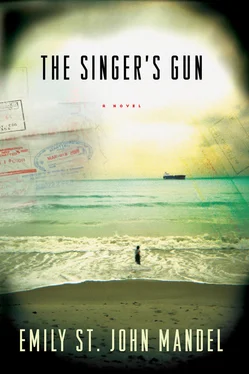“Mexico.” He held up the girl’s glass and gestured to the bartender. The bartender nodded, and began mixing vodka and something that looked like grape Kool-Aid. Anton tried not to watch.
“You mind if I ask again?”
“It’s Mexico. Really.”
“You don’t look like any of the Mexicans I know.”
“I’m a gringo,” she said. “My parents moved there from the States.”
“Can I ask the name of the city?”
“San Miguel de Allende. The kingdom of fake artists and retired Texans.” She was already halfway through the second martini and her eyes were bright. “How about you? Where are you from?”
“Brooklyn. How did you end up here?”
“I shot someone,” she said between sips. He laughed, hoping she was kidding, but she didn’t smile. “Then I took a bus to Mexico City,” she continued, “and then I got on a plane. I’ve been here for years now.”
“Why Naples, though? I’ve heard it can be dangerous here.”
“Not for me,” she said.
“Really.”
“No, see, look. .” She was fumbling in her purse for something, but then she caught sight of her drink and seemed to lose track of what she was looking for. She removed her hand from the bag and finished her drink and winked at the bartender, who smiled warily back.
“It isn’t dangerous here because you have pepper spray?”
“Oh, I don’t have pepper spray,” she said. She opened her purse and held it open for him. He peered in and saw the dull shine of the Beretta between a Hello Kitty wallet and a pack of spearmint gum. Anton leaned on the bar, shaken, while she finished her drink and then held the glass up to the light in case there might be a few hitherto unnoticed drops remaining.
“I hate guns,” he said. “I don’t believe in them.”
“Well, you don’t have to believe in them,” she said. “They’ll still work regardless. Can I have another drink?”
“Have you ever fired it?”
She laughed that silvery laugh again and put her glass down. Anton shivered.
“Is it loaded?”
“We’re in Napoli,” she said. “Be reasonable. Can I have another martini?” He was thinking of Ischia, of the boats in the harbor, of Elena, of his cat, of putting money on the counter and wishing her a pleasant evening and walking away down CorsoVittorio Emmanuele and never coming back to Naples again as long as he lived, but like a man in a dream he gestured at the bartender, who stepped forward and began mixing another poison-violet drink.
“Last one,” he said quietly. “Why do you have a gun?”
“I live alone by the train station. It isn’t really safe.”
“Tell me your name?”
She smiled.
“Your name for a drink. Doesn’t seem that unfair, does it?” Of course it seemed that unfair. He felt horrifically cheap and the evening was spiraling.
“Jane,” she said. The bartender set the third drink down on the countertop and she lifted the glass unsteadily to her lips.
“Jane? Really?”
“Jane,” she said. “I’m serious this time.” She leaned closer to him and beckoned. He leaned in and smelled the alcohol and sweet purple and acetone on her breath. “I’m going to go find the bathroom,” she whispered, “and then we’re going to do something fun.”
“What kind of fun?” he asked, a little desperate.
She inclined her head sideways to indicate the bartender, who was leaning against the counter and staring out the open door at the ceaseless traffic. There were still no other customers. She smiled and cocked her finger at Anton and whispered, “Bang. Bang.” She blew on the tip of her finger like a gunslinger blowing smoke from the tip of a gun and then fell against the bar in a fit of giggles. “We’ll be outlaws,” she said. “We’ll be like Bonnie and Clyde.”
“Are you crazy?”
“No no no, this way. .” She was laughing and could hardly get the words out, “this way we don’t have to pay for our drinks. Relax, there’s no one else in here. This place just opened. Do you see a security camera? I don’t.”
“Come on,” he said. “It isn’t funny.”
She winked at him. “Wait here while I go to the bathroom,” she said. She turned away from him and slid unsteadily from the barstool while Anton slipped the gun from her purse into his jacket pocket. Her dress clung to her body like broken glass. She reached for her bag and wavered away from him, sequins glittering down the dim corridor at the end of the room, until her dress flickered out behind a wooden door.
Anton stood up, opened his wallet, and left three twenty-euro bills on the bar — the bartender called after him, he had drastically overpaid, but he was on his way out the door and could not stop — and he began to walk rapidly downhill toward the Hotel Britannique. After a moment he broke into a run. The sidewalk was narrow in places; he had to dodge around people and heard himself gasping with every breath, I’m sorry, I’m sorry, I’m sorry, I’m sorry, the words turning into a meaningless sobbing for air, and the traffic was a blur of steel and death and lights at his fingertips. When he looked up he saw that the sky had gone starless. Past the warm soft lights of the Grand Hotel Parker’s, past the Hotel Britannique with its faded lobby full of tourist brochures, and then he darted across the street — horns blared, a Vespa swerved to avoid him — and jogged down the stairs toward the water. At the bottom of the steps he stopped running and settled into a loose staggering walk.
On the last ferry to Ischia he slumped over a railing on the outside deck, staring down at dark water and trying not to think about anything. The gun was a solid weight in his pocket. He couldn’t stop thinking about the things that might happen to a girl like that, drunk and alone in the seething city of Napoli, making her way home to an apartment near the train station unarmed. He had left the precious English-language books in the bar.
In the morning Anton woke with a pounding headache. He’d only sipped at the violet drink in the bar, but he felt poisoned. He took a cold shower and lay on top of his bed for a while before he went down to breakfast, thinking about what it would mean to never return to New York again.
Just before Aria’s fifteenth birthday she returned home to her father’s apartment after a weeklong absence, but the locks had been changed and there was a note on the door next to the eviction notice (Went to Ecuador, go stay at your uncle’s place) and from the street she saw that the curtains were gone from the windows. She came back to Anton’s neighborhood quickly, with enormous bravado and shaking hands. She sat at the table while Anton’s mother fluttered around her, bringing her a plate, a fork, some food, some coffee, you poor thing . When Anton’s father heard that his brother had taken off for Ecuador he almost punched a hole in the wall, and for the rest of that week everyone stayed out of his way. He talked to his vanished brother while he worked, while he did the dishes, in any situation where he was more or less alone and no customers were present: a furious muttered monologue about family and responsibility, punctuated by curses.
But Aria didn’t talk about her father at all. She didn’t talk about much of anything. She disappeared for long hours, she went to school and worked in the store, she listened to music in her room. She was a polite and quiet presence in their lives that year, always on the margins or just out of sight. Anton’s mother did what she could, but Aria was unreachable. After a few weeks there was a phone call from Ecuador. Her father apologized. He just couldn’t bear to be away from Aria’s mother any longer, he said, so he’d sold everything they had to pay for the plane ticket. The furniture. The dishes. Aria’s clothes. All temporary stuff, he assured his daughter. Nothing they couldn’t eventually replace. Aria’s mother had never felt like marrying Aria’s father while they were all in Brooklyn together, but now they were going to be married in Ecuador. They were happy. Sylvia had stopped drinking. It was unbelievable, miraculous, a whole new life. He said Aria was welcome to move to Ecuador and join them, but Aria laughed and hung up the phone.
Читать дальше





![Ричард Деминг - Whistle Past the Graveyard [= Give the Girl a Gun]](/books/412176/richard-deming-whistle-past-the-graveyard-give-t-thumb.webp)






